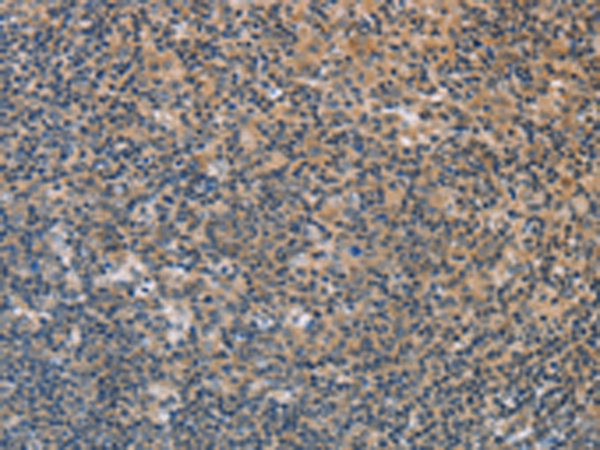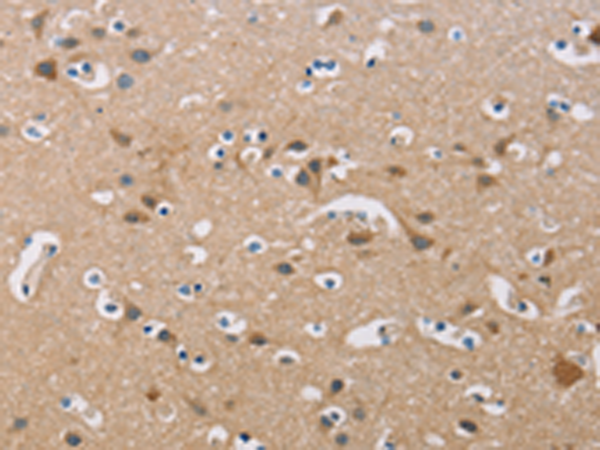


| WB | 咨询技术 | Human,Mouse,Rat |
| IF | 咨询技术 | Human,Mouse,Rat |
| IHC | 1/50-1/200 | Human,Mouse,Rat |
| ICC | 技术咨询 | Human,Mouse,Rat |
| FCM | 咨询技术 | Human,Mouse,Rat |
| Elisa | 1/2000-1/5000 | Human,Mouse,Rat |
| Aliases | PLM |
| WB Predicted band size | 10 kDa |
| Host/Isotype | Rabbit IgG |
| Antibody Type | Primary antibody |
| Storage | Store at 4°C short term. Aliquot and store at -20°C long term. Avoid freeze/thaw cycles. |
| Species Reactivity | Human, Mouse, Rat |
| Immunogen | Fusion protein of human FXYD1 |
| Formulation | Purified antibody in PBS with 0.05% sodium azide and 50% glycerol. |
+ +
以下是关于FXYD1抗体的3篇示例文献(注:以下为模拟示例,具体文献需根据实际数据库检索确认):
---
1. **文献名称**:*"A Monoclonal Antibody Targeting FXYD1 Reveals Dynamic Localization in Cardiac Myocytes"*
**作者**:Chen L, et al.
**摘要**:本研究开发了一种特异性识别FXYD1的单克隆抗体,通过免疫荧光和Western blot验证其在心肌细胞中的动态定位,发现其在缺血再灌注损伤后表达显著上调,提示其与心脏应激反应的关联。
2. **文献名称**:*"Phosphorylation-Specific Antibodies for FXYD1 Elucidate Its Role in Sodium Pump Regulation"*
**作者**:Kumar R, et al.
**摘要**:利用针对FXYD1不同磷酸化位点的抗体,揭示了其在调节钠钾ATP酶活性中的分子机制,证明Ser68磷酸化是响应β-肾上腺素信号的关键修饰位点。
3. **文献名称**:*"FXYD1 as a Biomarker in Colorectal Cancer: Validation by Immunohistochemical Analysis"*
**作者**:Garcia S, et al.
**摘要**:通过多克隆抗体进行组织免疫组化分析,发现FXYD1在结直肠癌中高表达且与患者预后不良相关,支持其作为潜在治疗靶点的可能性。
---
**提示**:实际引用时建议通过PubMed或Google Scholar检索最新文献,使用关键词“FXYD1 antibody”、“phospholemman antibody”或结合研究领域(如“FXYD1 cancer”)。部分经典文献可能涉及抗体开发或功能验证,例如:
- **FXYD1抗体开发**:*J Biol Chem* (2003) 上的早期研究。
- **疾病机制**:涉及心脏或肿瘤的文献(如*Circ Res*或*Oncogene*期刊)。
**Background of FXYD1 Antibodies**
FXYD1. also known as phospholemman, is a small transmembrane protein that regulates the activity of the Na+/K+-ATPase pump, a critical enzyme responsible for maintaining cellular ion gradients. It belongs to the FXYD protein family, which modulates ion transport in a tissue-specific manner. FXYD1 is highly expressed in the heart, skeletal muscle, and brain, where it fine-tunes sodium and potassium ion flux, impacting cellular excitability and osmotic balance. Its activity is further influenced by post-translational modifications, such as phosphorylation, which alter its interaction with the Na+/K+-ATPase.
Antibodies targeting FXYD1 are essential tools for studying its expression, localization, and functional roles in physiological and pathological contexts. These antibodies are commonly used in techniques like Western blotting, immunohistochemistry, and immunofluorescence to assess FXYD1 protein levels and distribution in tissues or cells. Researchers employ FXYD1-specific antibodies to investigate its involvement in diseases such as heart failure (where FXYD1 dysregulation affects cardiac contractility), cancer (linked to ion homeostasis and cell proliferation), and metabolic disorders. Both monoclonal and polyclonal FXYD1 antibodies are available, with validation including knockout controls or peptide-blocking assays to confirm specificity. Understanding FXYD1's role through antibody-based research continues to shed light on its regulatory mechanisms and therapeutic potential.
×